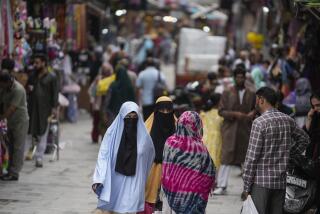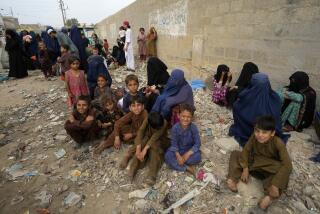India announces plan to free student demonstrators and soften hard-line security approach in Kashmir
- Share via
Reporting from New Delhi — India announced a new political initiative for the troubled Kashmir region on Saturday in a bid to address a summer of unrest that has left more than 100 civilians dead, some as young as 9, and hundreds injured at the hands of security forces.
The eight-point plan is a tacit acknowledgement that India’s hard-line approach has not worked. It includes freeing hundreds of students and stone-throwers from detention and reducing the number of bunkers, checkpoints and other features of India’s security footprint.
Schools and colleges will be reopened immediately, compensation of $10,000 per death extended to the families of victims and a fund established for infrastructure. Two teams will also be formed to address the concerns of Kashmiri residents.
Divided Kashmir, which is claimed by both India and Pakistan, has been the cause of two wars between the neighboring nuclear powers since they gained independence in 1947.
Analysts in Kashmir said the central government’s initiative was a step in the right direction but didn’t go far enough.
“They fall short of expectations,” said Sheik Shaukat Hussain, a law professor at Kashmir University.
Though India has offered to pay the families of those killed since June 10, it isn’t willing to investigate or penalize those responsible, he added.
The army and elements within the Indian government would fiercely resist a probe into the killings, making it a political non-starter. Any investigation would probably face criticism that it could demoralize the army and send a message that demonstrating and otherwise breaking the law is justified.
On other counts, analysts said security forces may have pledged to reduce their urban footprint, but many areas outside towns may see little change.
It was not clear whether the offer to free students and demonstrators, said to cover 255 youths, applies to those arrested for rock throwing that took place months and even years ago.
Hussain said reports were circulating in the valley a week ago that security forces knew a package was coming and had stepped up their detentions so they’d have higher numbers to release. The allegation could not be verified.
The government plan also says nothing about a demand by hard-line separatists that India acknowledge Kashmir is a disputed area, rather than claim it as an integral part of India.
Moderate groups said they would wait before reacting. “We will discuss and look at our options,” Yasin Malik, chairman of a faction of the Jammu Kashmir Liberation Front, told local media.
Aejaz Ahmed, 25, a student and protester living in Srinagar, the summer capital of the Indian-held portion of Kashmir, said the package was a decent first step, but added that the Armed Forces Special Powers Act, which gives the army and paramilitary broad legal immunity for its actions, should be removed.
“Some points are good but others are useless,” he said.
Armed militancy in the Indian-controlled Kashmir valley and infiltration from the Pakistan-controlled side by insurgents peaked in the 1990s. In recent years, locals have turned to stones rather than guns to voice their resentment and desire for independence.
But the Indian security force in the valley, which numbers half a million, was trained, organized and equipped to fight and kill guerrillas. It has largely failed to shift gears to match the reduced threat.
Security forces have maintained their use of high-powered weapons and blunt force despite calls to train them to respond to civilian disturbances, and employ more water cannons, rubber bullets and tear gas.
Decades of life under curfew, facing checkpoints every 500 feet at which they are forced to show ID cards and widespread allegations of human rights violations have also intensified resentment among Kashmiris, particularly the young.
“Releasing those detained is a good move … that we welcome with the depth of our heart,” said Javed Ahmad Dar, another protester. “But they are not addressing the basic problem, the core point being that Kashmir is a disputed area.”
mark.magnier@latimes.com
Anshul Rana in The Times’ New Delhi Bureau contributed to this report.
More to Read
Sign up for Essential California
The most important California stories and recommendations in your inbox every morning.
You may occasionally receive promotional content from the Los Angeles Times.













